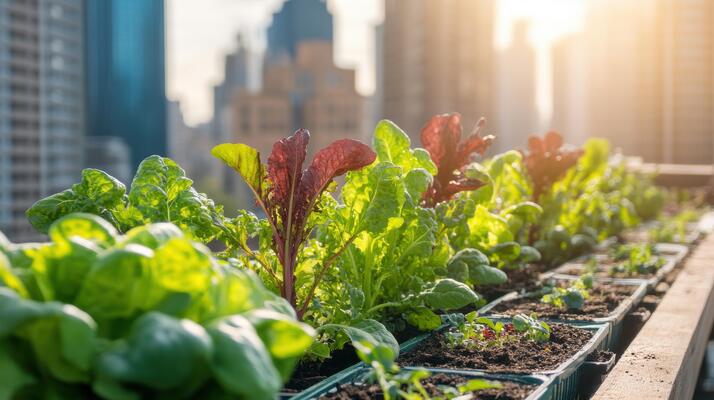Cultivating Hope in the Desert: The Rise of Urban Farming in Las Vegas Schools
Las Vegas is known for its shimmering neon lights, bustling casinos, and sprawling desert landscapes, but for those who call this city home, we know it’s so much more than its flashy Strip. Living in Las Vegas often means embracing the extreme — with summer temperatures that sizzle above 110°F and limited green spaces, we’ve learned to innovate and adapt. From water conservation to desert-friendly landscaping, this city is becoming a hub for sustainability. Now, we’re witnessing another transformative movement that’s changing Las Vegas in unexpected ways: urban farming in schools.
If you've ever driven past the suburban edge of the city and admired a green patch emerging from the dusty terrain, you might have stumbled upon one of these school-supported urban farms. Surprising as it sounds, students across Las Vegas are turning plots of barren land into thriving gardens, filled with tomatoes, kale, and even microgreens. But these aren’t just gardens; they’re classrooms in disguise — and they’re changing the way we think about education, sustainability, and our future.
Growing More Than Food
As a parent or a community member in the Las Vegas area, you’ve likely encountered the unique challenges our city faces: limited access to affordable fresh produce, the increasing need for water conservation, and a push for more eco-friendly living. Urban farming programs in local schools address all of these while teaching valuable lessons about nutrition, science, and environmental stewardship.
Imagine this: Students at a middle school in Henderson are learning the basics of math by calculating how much water their lettuce garden will need each week using drip irrigation — a sustainable method that’s crucial in a drought-prone region like ours. Over in North Las Vegas, high schoolers are diving into lessons on biology and chemistry while experimenting with hydroponic systems — growing plants without soil in water-based solutions. These are hands-on, real-world experiences you couldn’t replicate with a textbook.
What’s remarkable is how urban farming brings lessons alive in such a relatable way. Whether it’s measuring pH levels of the soil (or water, in hydroponic cases) or graphing the growth of plants over time, these activities make STEM education engaging. For kids who may have felt disconnected from traditional coursework, this could be the spark of curiosity that leads to a career in sustainability, agriculture, or environmental science.
A Cool Oasis in the Hot Desert
Living in one of the fastest-growing cities in the country can feel chaotic at times, and that’s especially true for our kids. Between the ever-present hum of technology and the relentless pace of urban life, there's little time for the simplicity of nature. This is where the gardens come in — and not just for growing food, but for growing peace of mind.
Urban farming offers students a much-needed retreat. Studies across the country have shown that gardening has a calming effect, helping to reduce stress and anxiety in children. Local teachers in Las Vegas report that students working in these green spaces develop patience, responsibility, and teamwork. There’s something profoundly satisfying about nurturing a seed, witnessing its growth, and enjoying the literal fruits of their labor. In a screen-dominated world, these gardens are becoming sanctuaries of connection — to each other, our environment, and ourselves.
Changing the Community, One Harvest at a Time
Urban farming in schools isn’t just about creating an enriching experience within the four walls of a classroom. The impact often extends far beyond the campus. Many Las Vegas schools are donating part of their harvest — think fresh zucchini, bell peppers, or herbs — to local food banks, directly addressing food insecurity in our community. Others are using the produce in school cafeterias, ensuring students have access to healthy, fresh meals.
At some schools, students sell their produce through small farmers’ markets, learning entrepreneurial skills like budgeting, marketing, and customer service. It’s not just about selling food — kids learn the value of hard work and the joy of contributing to their communities. For a city as dynamic as Las Vegas, where so many diverse backgrounds converge, urban farming projects provide a common ground — quite literally — for building connections and giving back.
Planting Seeds for a Greener Future
If you’ve ever visited Springs Preserve or walked through Downtown Summerlin’s farmer’s market, you know that sustainability is becoming a bigger part of Las Vegas culture. These urban farms in schools embody that same spirit — a commitment to creating a greener, more sustainable city for future generations. In a place like Las Vegas, where water is a scarce resource, these programs showcase innovative solutions, from composting kitchen scraps to using smart irrigation technology.
What’s most inspiring, though, is watching these students blossom alongside their gardens. They’re starting young, armed with the knowledge and experience to tackle environmental challenges in their own unique ways. Whether it’s learning about the water cycle, exploring renewable energy, or understanding the global implications of food systems, they’re becoming advocates for change. And in a city where resilience defines us, these desert blooms are a powerful reminder that even in the harshest conditions, something beautiful — and transformative — can grow.
As residents of this vibrant desert city, we know living here isn’t always easy. But initiatives like urban farming show us what Las Vegas has always been capable of: reinvention and perseverance. By investing in our students and their green thumbs, we’re not only cultivating gardens but planting the seeds for a brighter, more sustainable future. So next time you pass a school garden in your neighborhood, take a moment to celebrate what it represents: hope, growth, and the power to thrive against all odds.
